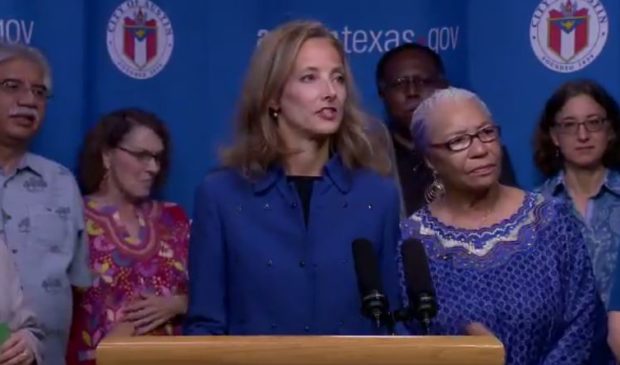Four Council members urge for new direction on CodeNEXT
Wednesday, June 20, 2018 by
Jack Craver Four City Council members signaled their discontent with the current direction of CodeNEXT process and announced an effort to develop a new code that is “equitable, sustainable, accessible, vibrant and community-driven.”
Surrounded by supporters at a City Hall press conference Tuesday morning, Mayor Pro Tem Kathie Tovo and Council members Alison Alter, Ora Houston and Leslie Pool argued that the current draft of CodeNEXT jeopardizes what makes the city special and will not necessarily lead to greater affordability.
“Right now Austin does not have a draft code that the community supports,” said Tovo in her opening remarks, adding that the city deserves a code that “balances growth and change alongside the needs of our longtime residents.”
Council Member Ora Houston decried what she described as a narrative that framed longtime residents – including renters and homeowners – as selfish and unwelcoming to newcomers. In fact, she said, it was the most “privileged” members of the community pushing that narrative.
Houston added that the new code needs to be “context-sensitive,” respecting the character of neighborhoods.
Council Member Alison Alter said that no member of the group rejects the notion that Austin needs more housing, but affordability is not simply a matter of supply and demand. To study economics, she said, is to learn of the countless ways that economic behavior is not attributed to supply and demand.
Alter also emphasized the importance of using the code to protect the environment and preserve open spaces throughout the city.
Council Member Leslie Pool said that the CodeNEXT process has left segments of the community feeling ignored and helpless in their attempts to voice their concerns about the new code.
“They don’t feel like anybody is listening,” she said.
Tovo, Pool, Alter and Houston did not reveal many details about what provisions of CodeNEXT they would like to change and how, but in an accompanying statement they referred to “a package of amendments” to the code that they plan to introduce.
Tovo did mention during the press conference that she is concerned about certain development decisions that the current draft of CodeNEXT leaves to city staff. She said that the group hopes to subject more of those decisions to a public process before either City Council or a land use commission, where members of the public can voice their opinions.
The group’s perspective provides a contrast to the more “urbanist” advocacy heralded by four of their colleagues: Council members Greg Casar, Delia Garza, Pio Renteria and Jimmy Flannigan. Those four held a press conference last August advocating a code that would dramatically increase housing supply and allow for more multifamily housing throughout central neighborhoods. They have argued that greater density will boost affordability by reducing demand as well as by allowing a greater diversity of housing types that serve different income levels. They have also argued that density will help reduce sprawl and facilitate public transit.
In debates over land use, including CodeNEXT, the two factions have often been on opposite sides. Perhaps most notably, it was Tovo, Houston, Alter and Pool who supported putting CodeNEXT on the ballot this November.
Meanwhile, Mayor Steve Adler and Council Member Ann Kitchen have generally positioned themselves as swing votes. Council Member Ellen Troxclair, the lone conservative on Council, has generally supported easing zoning restrictions, although she has not yet participated much in the CodeNEXT process; the recent Council meetings on the issue took place while she was on maternity leave.
While the four Council members said they are unsatisfied with the current draft of CodeNEXT, they did not argue that it should be abandoned, as proposed by the Zoning and Platting Commission and the ubiquitous signs throughout the city proclaiming, “CodeNEXT Wrecks Austin.”
Video still courtesy of ATXN.
The Austin Monitor’s work is made possible by donations from the community. Though our reporting covers donors from time to time, we are careful to keep business and editorial efforts separate while maintaining transparency. A complete list of donors is available here, and our code of ethics is explained here.
You're a community leader
And we’re honored you look to us for serious, in-depth news. You know a strong community needs local and dedicated watchdog reporting. We’re here for you and that won’t change. Now will you take the powerful next step and support our nonprofit news organization?









